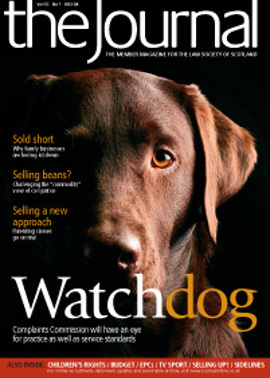Transition tales

As the anticipation of unknown terror fades and is replaced by grim reality, licensing lawyers wipe the sweat from their overworked brows, and occasionally emerge from their offices to swap stories and have a glimpse of daylight. If truth be told, the stories have the same structure as before. Met the new boss/licensing board – same as the old boss. But are we being fooled again?
Across the board
Scottish licensing is in the same patchwork state as before. Local autonomy means local variation and interpretation. Those boards which went about their business with common sense and efficiency (thankfully the vast majority), continue to do so. Of particular interest is the view being taken about children in licensed premises. The unsatisfactory state of the law under the 1976 Act was highlighted in the Nicholson report. In chapter 13 it stated: “We… consider that it is likely to be of benefit to family life in general if families and other mixed groups of adults and children can go together into all parts of licensed premises – certainly for a meal but also, perhaps, simply for a drink… We are also in agreement with those… who view with dissatisfaction the 8pm watershed which is a feature of children’s certificates”.
The draconian nature of the conditions attached to children’s certificates in some areas is such that the takeup has been very low. The 2005 Act has a presumption against children in licensed premises. Some boards are taking the view that if there was no children’s certificate, children should not be admitted. This ignores the fact that at present children of all ages can legally enter any part of licensed premises which does not contain a bar. Some boards have refused to learn from the mistakes of the past. Neither history nor ridicule can deflect them. My favourite condition specifies that children (those under 16) must be in the sight of the supervising adult at all times. This, we are told, is particularly important in toilet areas. As one who used to take three teenage daughters out to lunch, I see some difficulty in putting this into practice. Conditions which defy sense bring the whole licensing system into disrepute. This column does not name and shame but I am told that the board in question is in a dear green place.
Thought-out solutions?
We also await on a daily basis the next bright idea from Holyrood. I accept the view that, given the state of Scotland’s relationship with alcohol, doing nothing is not an option. I do wish, however, that politicians would realise there is no quick fix. The solution will take a generation of education and changing of attitudes. Consider how public reaction to a drunk driving conviction has changed since the breathalyser was introduced in 1967. What cannot be right is the introduction of measures which will penalise (not to say demonise) one section of the licensed trade. Off sales for 18 year olds in pubs but not in licensed groceries? I can already see enterprising publicans changing their display areas. Pricing as a deterrent does seem to work, and would at least be a level playing field; however, there are social and political implications in a measure which favours the rich over the not-so-well-off. It is also a smugglers’ charter, and would be very well received by licensed grocers in Berwick and Carlisle.
I also deplore the downright dishonesty of some of the accompanying propaganda. Those supporting the ban on under-21s buying off-sales point to the “unqualified success” of an experiment in Armadale, West Lothian. Off-sales owners agreed (whether under duress or not is unclear) to sell only to over-21s over a period of six weekends. The amount of antisocial behaviour, vandalism etc dropped dramatically. What the propagandists fail to tell us is that the police presence in the town over those six weekends was on a scale never hitherto witnessed. Carry out the same experiment with the same police presence as normal, and then measure the results. Even lawyers have heard of scientific method.
Will Scotland be a better place when the 2005 Act is fully in force? I am really not sure. Perhaps I may have a clearer idea this time next year. I would genuinely be interested in readers’ views (and details of any lunacy emanating from a board near you), either through the editor or directly.
Tom Johnston, Young & Partners LLP, Dunfermline. e: tgj@businesslaw.co.uku
In this issue
- No place for secrecy
- Getting a Get in Scotland - 2
- Crunch time
- Home reports: oh no they won't
- Recoverable proceeds
- Justice diverted
- On the scent
- Learning to live together
- Learning to live apart
- ARTL: one lender's view
- Games without frontiers
- Games without frontiers (1)
- Speaking up for children
- Poor relations?
- Justice for sale?
- Shining light into the darkness
- Legal aid review gets down to work
- CPD for new lawyers
- Professional Practice Committee
- Time to sell up?
- Beyond chip and PIN
- Lender claims
- The price of justice
- Transition tales
- Falling between stools
- The Environment v X
- More equal than others?
- Points to prove
- Website reviews
- Book reviews
- Whose star will shine?
- Taken for granted
- An A to G of EPCs






